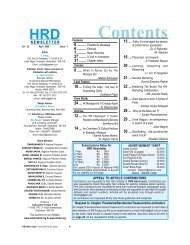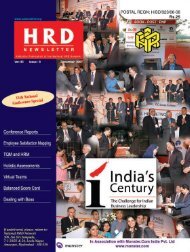NHRD April 2013.pdf - National HRD Network
NHRD April 2013.pdf - National HRD Network
NHRD April 2013.pdf - National HRD Network
Create successful ePaper yourself
Turn your PDF publications into a flip-book with our unique Google optimized e-Paper software.
MENTORS AND COACHES<br />
Anita Bhogle and Harsha Bhogle<br />
About the Authors<br />
Anita Bhogle and Harsha Bhogle run Prosearch<br />
Consultants and have done upwards of 350<br />
corporate speaking programs to India’s leading<br />
companies on learnings from support for<br />
managers. Their book “The Winning Way” has<br />
been a big national best-seller.<br />
Increasingly, when we do our corporate<br />
speaking events these days, we are<br />
asked about mentors and managers, about<br />
coaches and captains and sport presents<br />
a wonderful laboratory to study how the<br />
two roles work. Often they do, but when<br />
they don’t, the results can be painful. And<br />
we have found that while there might be<br />
the odd difference, the parallels in the<br />
corporate world are many. And often<br />
relevant.<br />
Cricket is an unusual sport in these matters<br />
in that it is the only one in which the<br />
captain is actually on the field. In almost<br />
all sport leaders demand performance,<br />
indeed they must, but it is in cricket alone<br />
that they have to perform and deliver<br />
in conditions that are similar to those<br />
that players under them experience. The<br />
manager of a football team has the power to<br />
demand, to substitute, to drop, to penalize<br />
but he doesn’t himself have to take on the<br />
opposition center back who is six inches<br />
taller than him. By contrast the captain<br />
in cricket must demand that his batsmen<br />
stand up to the opposition fast bowler on<br />
a fiery pitch but then when it is his turn<br />
to bat, he has to do the same.<br />
And that is why in cricket, it is understood<br />
that the captain runs the ship and the coach<br />
acts as the support staff; valued, even<br />
reasonably powerful, but eventually he is<br />
the support staff. It works better like that<br />
though it can lead to gnash teeth and long<br />
evenings in the bar. And so the job of the<br />
coach is to show the way, suggest a path<br />
where a player might see a wall. His role<br />
is important because the captain may have<br />
his own battles to fight and it is difficult to<br />
be a performer and an adviser, especially<br />
when the kid being advised might one day<br />
become better than the captain on the field!<br />
And so it is said that the coach must take<br />
players to places they haven’t been to<br />
before. It is a lovely line because a coach<br />
has the perspective that comes with age<br />
and experience but he is also watching<br />
the game from a hundred yards away and<br />
so sees it differently. Critically, the coach<br />
doesn’t compete with his players and that<br />
can allow him to be benevolent. That is<br />
where the coach most mirrors corporate<br />
mentors. And you can see why the mentor<br />
in corporate life must necessarily be older,<br />
have a more relaxed perspective than say,<br />
a line manager, and must have enough<br />
28<br />
<strong>April</strong> | 2013 <strong>N<strong>HRD</strong></strong> <strong>Network</strong> Journal

















